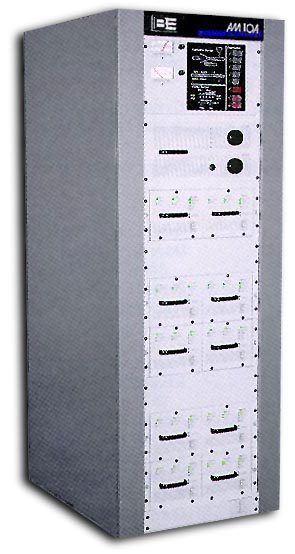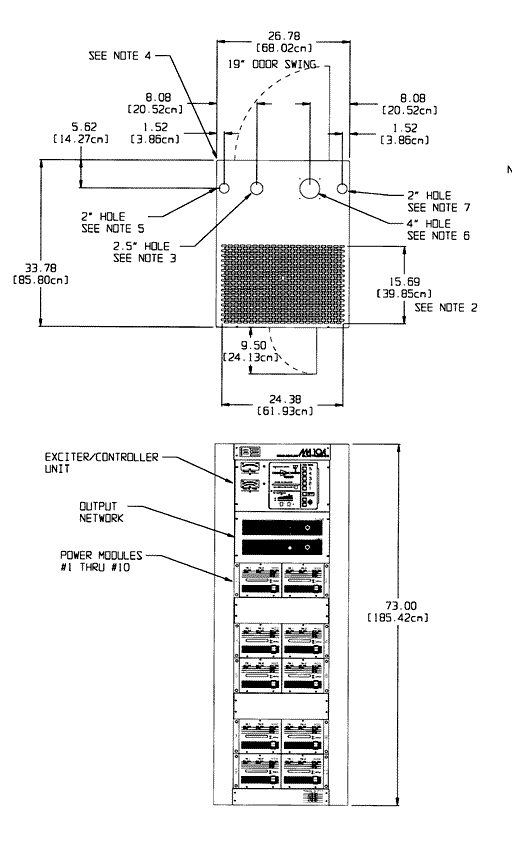|
BE AM 10A, 10
KW Solid State AM Transmitter
 
Transmitter Configuration:
The AM-10a is comprised of the following
assemblies: One Exciter Control Unit (ECU), One Driver Panel, Five
Power Blocks, One Output
Network, Five Power Supply Panels, One AC Distribution Panel, One
Breaker Panel, and Five Fan Assemblies.
PA
Configuration:
Ten plug-in power modules for easy front panel removal, rated at
1100 watts RF power o1utput. Each power module is comprised of two
power amplifier boards and one modulator board. The power amplifiers
use high efficiency class E (patented) switching amplifiers in push
pull mode. The modulator uses a high efficiency forward Pulse Width
Modulation (PWM) switchmode converter.
Power
Output:
10KW nominal. 50 watts to 10,800 watts capability. Five (5) Preset
Power levels available by local or remote control. Power Controls 1
& 2 adjustable between 50 and 1250 watts. Power Control 3 is
switchable between either 50 to 5000 watts or 3500 to 10,800 watts.
Power Control 4 & 5 adjustable between 3500 and 10,800 watts.
Operation With Eight Power Modules:
The transmitter will operate at reduced power output (20-35%
typical) with five power modules plugged-in, relative to the
selected power with ten operating modules.
RF
Output Load Impedance:
50 ohms, unbalanced. Matching network to optimize nominal VSWR of
1.4:1 at any phase angle at carrier frequency.
Output Connector:
1 5/8" female EIA flange.
Load
VSWR:
Nominal 1.4:1 at full carrier power. Will operate into higher VSWR
with automatic power reduction, open and short circuit protected.
Modulation Capability:
145% peak positive capability at 10,800 watts. 130% into 1.4:1 VSWR.
Audio
Frequency Response:
(Mono) +/-0.5dB, from 20Hz to 10kHz at 90% negative modulation
(linear phase mode). +0.1dB, -3dB from 20Hz to 10kHz at 90% negative
modulation, standard configuration.
Audio
Harmonic Distortion:
(Mono) Less than 0.8% (typically .6%), 20Hz to 10kHz, at 10 KW; Less
than 1.5%, 20Hz to 10kHz, at 5 KW; Less than 2%, 20Hz to 10kHz, at
2.5 KW; Less than 3%, 20Hz to 10kHz, at 1 KW.
Stereo Separation:
-30dB or better (typically -40dB), 50Hz to 10kHz, at 50% single
channel modulation into a 50 ohm resistive load, at rated power.
Squarewave Tilt:
Less than1% at 40Hz, less than 1.5% at 20Hz, 90% negative
modulation.
Noise:
(Mono) Better than 65dB below a reference level equivalent to 100%
negative modulation in a 22Hz to 30kHz bandwidth, unweighted.
Noise:
(Stereo) Better than 55dB below a reference level equivalent to 100%
negative modulation of either Left or Right channel in a 22Hz to
30kHz bandwidth, unweighted.
AC
Power Consumption:
13.3
KW (typically 13KW), no modulation of 10 KW carrier. 20 KW
(typically 19.5 KW), 100% sinusoidal modulation of 10 KW carrier.
Overall Efficiency:
75% or better (typically 77%), 100% sinusoidal modulation of 10 KW
carrier (AC line input to RF output).
Metering:
Output Forward Power (High Scale 0-12,000 watts, Low Scale 0-3000
watts); Output Reflected Power (High 0-1200 watts, Low Scale 0-300
watts); AC Line Input Voltage (150-300 volts).
Remote Monitoring Transmitter:
OFF Status; Power Level Status 1, 2, 3, 4, 5; Mode Status (Stereo,
Mono L+R, L, R); Forward and Reflected Power Outputs (0-2.5 or 0-5
volts, jumper selectable); Antenna Conflict; Maintenance; Lightning;
1.2:1 VSWR; Reflected Power High (>400 watts) AM-10; Reflected Power
Emergency (>2700 watts); Foldback (Output Power); Overtemperature;
Exciter Fault; Power Module Fault; Power Supply Fault; Alarm Status.
Harmonic and Spurious Suppression:
Meets or exceeds FCC, DOC, and CCIR requirements, when preceded by
external NRSC-1 compatible audio low pass filter(s).
Carrier Frequency Range:
522kHz to 1705kHz. Supplied on one frequency (synthesized), as
ordered. Accommodates 9kHz or 10kHz channel spacing (9kHz requires
an optional crystal).
Carrier Frequency Stability:
+/-3 ppm, 0 to 50 degrees, centigrade.
Carrier Shift:
Less than 1% at 95% negative modulation at 1kHz.
Type
of Modulation:
Pulse Width Modulation of L+R envelope with integrated standard
C-QUAM AM stereo. An RF input connector (BNC) is also provided for
an external stereo exciter.
Modes:
Stereo, Mono L+R, Mono L, Mono R by local or remote control.
Modulation Input Indication: Peak reading, color coded, LED bar
graph display with an autorange feature for monitoring positive or
negative input levels of four different audio channels (L/R or L+R/L-R)
in the transmitter.
Audio
Input Level:
+10dBm, +/-dB, L=R (or mono) to produce 100% L+R envelope
modulation. Other input levels accommodated by internal resistor
selection.
Audio
Input Impedance:
600 ohms. Inputs are balanced, transformerless, and resistive with
passive RFI filtering. Other impedances can be accommodated.
Audio
Harmonic Distortion:
(Stereo) Less than 1.5% (typically <1%), at 50% single channel
modulation, 50Hz to 10kHz, at rated power.
Audio
Intermodulation Distortion:
(Mono) 1.2% or less (typically .8%), 1:1 ratio; 1.7% or less,
typically 1%, 4:1 ratio, 60/7000Hz SMPTE standards at 85%
modulation, at rated power.
CCIF
Intermodulation Distortion:
(Mono) 1% or less (typically .6%), 1:1 ratio, 4kHz/5kHz at 85%
modulation, at rated power.
Transient Intermodulation Distortion:
(Mono) 1% or less (typically .7%), 4:1 ratio, 2.96kHz square
wave/8kHz sinewave at 85% modulation, at rated power.
Squarewave Overshoot:
(Mono) Less than 0.1% (typically 0%), at 400Hz, 90% modulation
without HF boost circuit (linear phase mode).
Squarewave Overshoot:
(Stereo) Less than 1% (typically 0%), at 400Hz, 50% single channel
modulation without HF boost circuit (linear phase mode).
Output Power Regulation:
Less than 1% (typically 0%), change in output power with variation
of AC line input voltage from 196 to 252 VAC.
RF
Monitoring Provisions:
2 volts RMS nominal RF output sample into 50 ohms input of the
modulation monitor, adjustable from the transmitter front panel for
each of the five power levels.
Remote Interface:
Built-in simple interface for most remote control and monitoring
systems.
Remote Control:
Transmitter OFF; Power Level Control 1, 2, 3, 4, 5; Power Raise and
Lower; Mode Control (Stereo, Mono L+R, L, R); Antenna Interlocks (A,B,C);
External Transmitter Mute; Remote Failsafe; External Interlock;
Alarm Reset.
Operating Temperature:
0 to 50 degrees, centigrade.
Operating Humidity:
0 to 95% (non-condensing).
Operating Altitude:
(AMSL) 10,000 feet (3,048 meters) at 60Hz of 7,500 feet (2,286
meters) at 50Hz.
Safety STD:
- meets IEC 215.
|